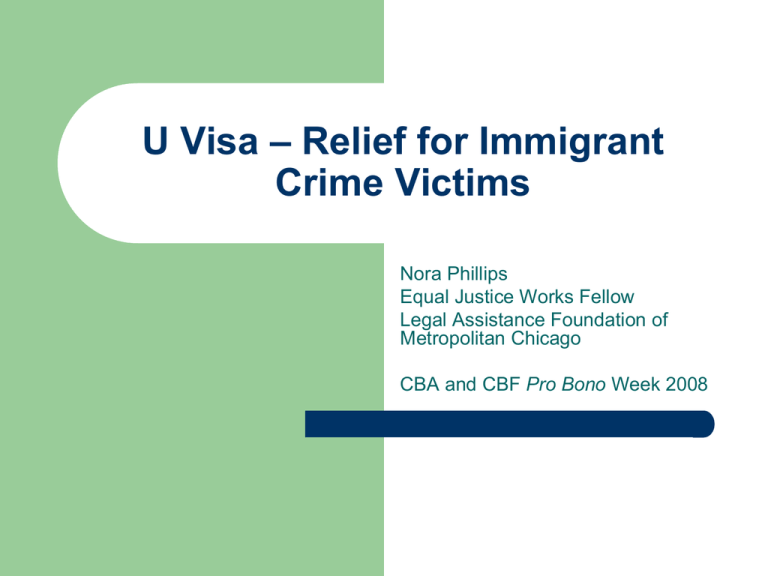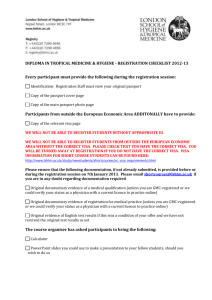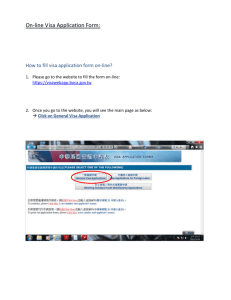
U Visa – Relief for Immigrant
Crime Victims
Nora Phillips
Equal Justice Works Fellow
Legal Assistance Foundation of
Metropolitan Chicago
CBA and CBF Pro Bono Week 2008
U Visa Background
Created by the Victims of Trafficking and
Violence Protection Act (VTVPA) of 2000
Goal – to encourage undocumented crime
victims to come forward and cooperate with
law enforcement
Long-awaited Interim Rule was published in
the Federal Register on 9/17/07, effective
date was 10/17/07
Pre-Regulation Policy for U Visa
Before the publication of regulations,
applicants could apply for “Interim Relief,”
which would place them in Deferred Action
status and allow them to apply for a work
authorization card (EAD) and Social Security
Number.
After 10/17/07, the effective date of the
Interim Rule, no more Interim Relief
applications could be filed.
Applicable Law
Immigration and Nationality Act (INA) Sections:
–
–
–
§ 101(a)(15)(U) – definition and requirements
§ 214(p) – numerical limitation, petitioning procedure
§ 245(m) – adjustment of status
Code of Federal Regulations
–
Most important section is 8 CFR § 214
U Visa Requirements –
§ 101(a)(15)(U)
“the alien has suffered substantial physical or mental abuse as
a result of having been a victim of criminal activity…”
“the alien (or in the case of an alien child under the age of 16,
the parent, guardian, or next friend of the alien) possesses
information concerning criminal activity…”
“the alien (or in the case of an alien child under the age of 16,
the parent, guardian, or next friend of the alien) has been
helpful, is being helpful, or is likely to be helpful” to Federal,
State, or local authorities in the investigation or prosecution of
the crime
“the criminal activity… violated the laws of the United States or
occurred in the United States…”
Direct Victims
8 CFR 214.14(a)(14)
–
Direct victims – victim “directly and proximately
harmed by qualifying criminal activity”
Self-explanatory
–
Example: Anaïs, a 14 year-old undocumented
girl, is raped. She calls the police and testifies
against her rapist in court. Under the U visa
provision, Anaïs is a direct victim.
Indirect Victims
In certain circumstances, individuals other than the
victim can apply for a U visa:
–
–
Where the victim is an alien child under 16, the parent, legal
guardian, or other family member, may apply for principal U
visa status.
Example: Juan is an undocumented Colombian man. His 8
year-old daughter, Ana, who is also undocumented, is the
victim of sexual abuse by her neighbor. Juan contacts the
police, encourages Ana to talk with them, and accompanies
her to all court appointments. Under the new regulations,
Juan can apply for a U visa.
Derivatives
Can be derivatives whether in the U.S. or abroad; if
abroad, the visa will be forwarded to a U.S.
embassy/consulate abroad and the derivative can
use the visa to travel to the U.S.
If principal applicant is under 21
–
If principal applicant is over 21
–
Derivatives = principal’s spouse, children, unmarried
siblings under 18 (on filing date of principal’s petition), and
parents
Derivatives = principal’s spouse and children
Form I-918, Supplement A
Qualifying Crimes – INA
§101(a)(15)(U)(iii)
Qualifying crimes under the statute
–
–
[R]ape; torture; trafficking; incest; domestic violence; sexual
assault; abusive sexual contact; prostitution; sexual
exploitation; female genital mutilation; being held hostage;
peonage; involuntary servitude; slave trade; kidnapping;
abduction; unlawful criminal restraint; false imprisonment;
blackmail; extortion; manslaughter; murder; felonious
assault; witness tampering; obstruction of justice; perjury; or
attempt, conspiracy, or solicitation to commit any of the
above mentioned crimes
“or any similar activity” also encompassed by statute for
related, non-enumerated crimes
U Visa Application Process
Form I-918 (available at www.uscis.gov
“Immigration Forms”), which includes:
–
–
–
I-918, Petition for U Nonimmigrant Status
I-918 Supplement A, Petition for Qualifying Family
Member of U-1 Recipient
I-918 Supplement B, U Nonimmigrant Status
Certification
Victim’s Statement
Required document, which should include “[t]he
nature of the criminal activity, when the criminal
activity occurred, who was responsible, the events
surrounding the criminal activity, how the criminal
activity came to be investigated or prosecuted, and
what substantial physical and/or mental abuse was
suffered as a result of having been the victim of
criminal activity.”
Statement should be signed and dated by applicant.
Additional Documents
Court documents (i.e., certified disposition to show conviction)
Police reports
Orders of protection
Letter from counselor, doctor, child’s teacher, social worker,
etc.
Photographs taken to document physical abuse
News articles (if crime received media coverage)
Hospital records
Other documents showing cooperation and/or abuse – be
creative!
Law Enforcement Certification
Most crucial element of U visa application and what
makes the U visa so unique – very few visas require
documentation from law enforcement agencies
Form I-918, Supplement B
Must be completed by law enforcement official
designated by each agency
Must certify that applicant is assisting investigation
or prosecution, has in the past, or will in the future
Ineligibility for the U Visa: The I-192
Waiver
Grounds of inadmissibility in immigration law apply, even
though most applicants are already in the U.S.
–
If any of these grounds apply, the applicant must file an I-192
waiver.
–
See INA § 212 for grounds of inadmissibility
Until the alien turns 18, no unlawful presence is counted
The recent trend seems to be that applications filed with the I192 have a better chance of faster adjudication than those filed
without the I-192.
If applicants have any of these issues, please contact referring
non-profit agency (LAF, NIJC, etc.) before filing.
Benefits under the U Visa
If your client’s application is approved, she will
receive the following:
–
–
–
–
A work authorization card (EAD) valid for 4 years, which can
be used to obtain a valid social security number and driver’s
license;
Protection against removal (deportation);
After 3 years in U visa status, the possibility to apply for a
green card;
The ability to travel for a limited number of individuals.
The same benefits will result for derivative family
members with approved U visa applications.
Fees
I-918 - $0
I-192 - $545 (NO fee waivers available)
Fingerprints - $80 (fee waiver available)
–
–
Clients under 14 or over 80 do not need to be
fingerprinted.
Clients should be encouraged to pay this if at all
possible.
What to Expect
LAF will refer clients with minimal risk factors and will provide
mentoring, support, and language interpretation, if necessary.
The vast majority of LAF U visa clients are women and children
who have been victims of domestic violence and sexual abuse.
While it is unknown at what rate USCIS will approve U visas,
the Interim Relief approval rate was very high (5,800 out of
7,000 approved). Clients and their families are given the
stability and protection that they need and a chance to achieve
a more permanent remedy later on.
How to Become Involved
Immigrant Crime Victims Assistance Project,
Legal Assistance Foundation of Metropolitan
Chicago
–
Nora Phillips, 312/347-8390
nphillips@lafchicago.org




